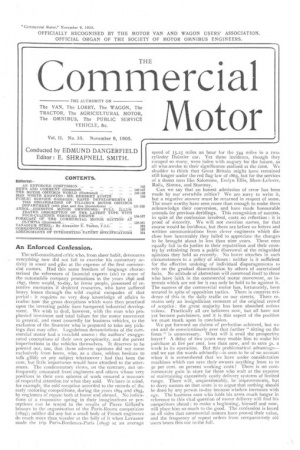An Enforced Confession.
Page 1

If you've noticed an error in this article please click here to report it so we can fix it.
The self-constituted critic who, from sheer habit, denounces everything new did not fail to exercise his customary activity in sneer and gibe at the expense of the first commercial motors. Had this same freedom of language characterised the references of financial experts (sic) to some of the automobile company promotions in the years 1896 and 1897, there would, to-day, be fewer people, possessed of retentive memories if depleted resources, who have suffered heavy losses through the wild capital escapades of that period : it requires no very deep knowledge of affairs to realise how the gross deceptions which were then practised upon the investing public have hampered industrial development. We wish to deal, however, with the man who prophesied imminent and total failure for the motor movement in general, and most assuredly for business vehicles, to the exclusion of the financier who is prepared to take any pickings that may offer. Lugubrious denunciations of the commercial motor had a two-fold source : the authors' exaggerated conceptions of their own perspicacity, and the patent imperfections in the vehicles themselves. It deserves to be pointed out, too, that these adverse opinions did not come exclusively from bores, who, as a class, seldom hesitate to talk glibly on any subject whatsoever : had that been the case, but little importance would have attached to the utterances. The condemnatory views, on the contrary, not unfrequently emanated from engineers, and others whose very positions in their own spheres of work ensured a measure of respectful attention for what they said. We have in mind, for example, the cold reception accorded to the records of the early motoring competitions, during the years 1894 and 3895, by engineers of repute both at home and abroad. No indications of a responsive spring in their imaginations or perceptknis can be traced to the results of Pierre Giffard's labours in the organisation of the Paris-Rouen competition (1894); neither did any but a small body of French engineers .do much more than wonder at the folly of it when Levassor made the trip Paris-Bordeaux-Paris (1895) at an average speed of 15.25 miles an hour for the 744 miles in a twocylinder Daimler car. Yet these incidents, though they escaped so many, were laden with augury for the future, as all who awoke to their significance realised at the time. We shudder to think that Great Britain might have remained still longer under the red flag law of 1865, but for the services of a dozen men like Salomons, Evelyn Ellis, Shaw-Lefevre, Rolls, Simms, and Sturmey.
Can we say that an honest admission of error has been made by our erstwhile critics? We are sorry to write it, but a negative answer must be returned in respect of some. The more worthy have seen more than enough to make them acknowledge their conversion, and have made honourable amends for previous deridings. This recognition of success, in spite of the confession invoked, casts no reflection : it is proof of sincerity. We will not mention names, for that course would be invidious, but there are before us letters and written communications from clever engineers which disclose how lamentably they failed to appreciate ihe changes to be brought about in less than nine years. These men equally fail to do justice to their reputations and their country by refraining from a public disavowal of the misguided opinions they held so recently. No lustre attaches in such circumstances to a policy of silence : neither is it sufficient for the effective undoing of individual disparagements to rely on the gradual dissemination by others of ascertained facts. No attitude of abstention will commend itself to those who have faith in the commercial motor movement, as interests which are not for it can only be held to be against it. The success of the commercial motor has, fortunately, been secured in spite of opposition tactics. There is concrete evidence of this in the daily traffic on our streets. There remains only an insignificant remnant of the original crowd of sceptics: the great majority has been absorbed nol ens volens. Practically all are believers now, but all have not yet become purchasers, and it is this aspect of the position we must touch upon in conclusion.
We put forward no claims of perfection achieved, but we can and do conscientiously aver that further" sitting on the fence " is unnecessary. What will it avail the prospective buyer? A delay of two years may enable him to make his purchase at five per cent, less than now, and to save 5s. a week in its operation. But this problematical advantage— and we use the words advisedly—is seen to be of no account when it is remembered that we have under consideration machines which can save their owners anything from 10 to 50 per cent, on present working costs ! There is no commensurate gain in store for those who wait at the expense of maintaining excessively costly delivery systems of limited range. There will, unquestionably, be improvements, but to decry motors on that score is to argue that nothing should be done by any person to-day because wisdom increases with age. The business man who folds his arms much longer in reference to this vital question of motor delivery will find his competitors ahead : to make a, beginning, himself and now, will place him so much to the good. The confession is heard on all sides that commercial motors have proved their value, and the frequency of repeat orders from comparatively old users bears this out to the full.




















